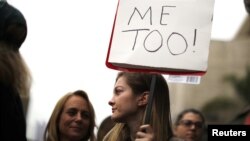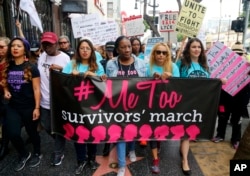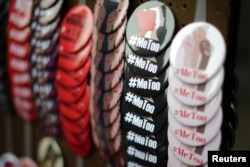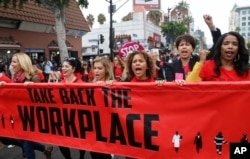Student Union
- By Katie Nicora
Sex Assault Not Unusual on Campus, Says #MeToo

She’d never been in his apartment at night, or even dusk, as it was now. Low purple light spilled into the living room, its walls lined and stacked with books. Light from the TV flashed red, blue and white, the nightly news.
She was 19 and the man beside her -- an intern supervisor -- was far too old to be putting an arm around her shoulders. Or sliding closer on the couch, as he was doing now, cupping her face in his hands to plant a kiss.
The story surprised her friends, but not deeply. Same song, different verse, they said. All her friends had experienced that particular blend of discomfort and fear brought on by an older man overstepping his authority.
In the days following, she poked around, searching out other female students who’d worked with him. One by one, they told her the same thing: No, they’d never gotten weird vibes. No, they’d never been invited to work at his apartment. And no, he’d definitely never touched them.
Knowing it would be another case of “he said/she said,” and that she had no evidence to show the school, she let it go. Statistics show that is not an unusual response.
But these past few weeks have seen a wash of public support for victims of sexual harassment and assault after powerful Hollywood producer Harvey Weinstein was outed for longtime predation.
Survivors are speaking up louder than ever, and campus activists are using that momentum to end the dynamic that powerful men -- like professors -- have over students who are eager to please intellectually and for good grades.
Women 18-24 are more likely to experience sexual violence than any other female demographic in the U.S., according to Rape, Abuse and Incest National Network (RAINN). College students within that age group are three times more likely than the average American woman to be assaulted. Young women within that age group not attending university are four times more likely.
According to a 2014 report from the U.S. Department of Justice, about 80 percent of victims knew their offender. No matter where they occur, these incidences are likely to go unreported, off or on campus. Nearly half of all targets say they thought their offender was under the influence of drugs or alcohol at the time of assault.
And, 20 percent of both groups cited fear of reprisal as the reason for not reporting.
“It’s absolutely heartbreaking,” said Clarke Rose, a student at the American University of Paris. “More importantly, it’s [expletive] necessary” to bring the issue to light.
Awareness campaign
In the days following allegations against Weinstein, millions took to Twitter, Instagram, Facebook, and other social media to share the hashtag #MeToo. The posts were part of an awareness campaign, aimed at exposing the pervasiveness of sexual harassment and assault, and rape culture in the United States.
Rose took part in France’s parallel – and somewhat more aggressive – campaign, #BalanceTonPorc, or “rat out your pig.”
“A lot of people have responded to #MeToo by asking why survivors are always the ones who have to come forward and bear our traumas in order for people to see us as human,” said Sofie Karasek, 22, to MTV. Karasek organized a candlelight vigil for the survivor advocacy group, End Rape on Campus, in Washington.
“It’s also a crucial time to point out that people accused of sexual assault don't just leave college and then disappear into the ether,” she said. “They can become powerful people who run companies, like Harvey Weinstein.”
In the weeks since, more allegations have spilled out, many against notable and powerful men. Female legislators and state employees have spoken out about their male colleagues in California, Massachusetts, and other states, citing harassment and inappropriate behavior.
In the last week, a criminal investigation was opened into allegations of sexual misconduct against three psychology professors at Dartmouth College in Hanover, New Hampshire. At Berklee College of Music in Boston, the administration caught flak this week for allowing a professor to quietly leave the school after a student accused him of sex abuse.
“Rather than being able to fully focus on coursework and learning, these students are burdened with the constant fear of violence and harassment on campus,” said Shivani Desai, a national campus organizer for the Feminist Majority Foundation (FMF).
“The #MeToo movement highlighted a reality of violence that women, queer, and trans folk already painfully and intimately knew – because we live it day in and day out,” Desai said.
“The power and reach of millions of voices provided a national platform, one that emphasized the dangerous culture that affords perpetrators and bigots positions of power and allows them to make harmful decisions.”
Student activists are “meeting with their administrators” to push back on issues like Title IX guidelines, which prohibit gender discrimination -- such as sexual harassment -- at colleges and universities that receive federal funding. Those guidelines were recently rolled back by Education Secretary Betsy DeVos.
A recent poll out from ABC News and the Washington Post shows 54 percent of American women have experienced “unwanted and inappropriate sexual advances” in the workplace. Thirty percent of women said their male colleagues were the perpetrators, with 25 percent saying these were colleagues who held sway over their careers.
Like their college-age counterparts, 95 percent of American women reported the offending male colleagues went totally unpunished. Since the last similar poll conducted in 2011, a majority of those polled said they consider sexual harassment a serious problem.
“Students have been organizing against sexual violence for countless years, and they will continue to fight for themselves and their communities,” Desai said of on-campus activists.
“What is most important, is that at this moment in history, we, all assault survivors, are sharing and listening and loving and finding out, we are not alone,” Rose said.
Do you know someone who has been harassed or assaulted by an older, more powerful person? Please share your thoughts in the Comments here, and visit us on Facebook, Twitter, Instagram and LinkedIn. Thanks!
See all News Updates of the Day
- By VOA News
Competition grows for international students eyeing Yale

It’s tough to gain admission to Yale University, and it’s getting even tougher for international students as standout students from around the world set their sights on Yale.
The Yale Dale News, the campus newspaper, takes a look at the situation here.
- By VOA News
Student from Ethiopia says Whitman College culture made it easy to settle in

Ruth Chane, a computer science major from Ethiopia, writes about her experiences settling into student life at Whitman College in the U.S. state of Washington.
"The community at Whitman College made sure I felt welcomed even before I stepped foot on campus," she says.
- By VOA News
Claremont Colleges student gets a shock when she heads home to Shanghai

In The Student Life, the student newspaper for the Claremont Colleges, a consortium of five liberal art colleges and two graduate schools in Claremont, California, student Rochelle Lu writes about readjusting to her Shanghai home after spending a semester in the United States.
- By VOA News
Cedarville University aims to ease transition for international students

Cedarville University in the U.S. state of Ohio says it’s got more than 140 international students representing 44 countries.
Here, the school interviews Jonathan Sutton, director of international student services. He talks about his job and the opportunities for international students on campus.
- By VOA News
Morehouse College offers prospective students tips on applying and thriving

Morehouse College, a private, historically Black liberal arts college in the U.S. state of Georgia, offers a guide for international students interested in attending the school.
Among the tips to apply and thrive at Morehouse:
- Take advantage of the school’s orientation program
- Turn to the school’s Center for Academic Success for tutoring, support and more
- Immerse yourself in campus life via clubs and societies
- By Reuters
US reviews Columbia University contracts, grants over antisemitism allegations

The administration of President Donald Trump said on Monday it will review Columbia University's federal contracts and grants over allegations of antisemitism, which it says the educational institution has shown inaction in tackling.
Rights advocates note rising antisemitism, Islamophobia and anti-Arab bias since U.S. ally Israel's devastating military assault on Gaza began after Palestinian Hamas militants' deadly October 2023 attack.
The Justice Department said a month ago it formed a task force to fight antisemitism. The U.S. Departments of Health and Education and the General Services Administration jointly made the review announcement on Monday.
"The Federal Government's Task Force to Combat Anti-Semitism is considering Stop Work Orders for $51.4 million in contracts between Columbia University and the Federal Government," the joint statement said.
The agencies said no contracting actions had been taken yet.
"The task force will also conduct a comprehensive review of the more than $5 billion in federal grant commitments to Columbia University."
The agencies did not respond to requests for comment on whether there were similar reviews over allegations of Islamophobia and anti-Arab bias.
Columbia had no immediate comment. It previously said it made efforts to tackle antisemitism.
College protests
Trump has signed an executive order to combat antisemitism and pledged to deport non-citizen college students and others who took part in pro-Palestinian protests.
Columbia was at the center of college protests in which demonstrators demanded an end to U.S. support for Israel due to the humanitarian crisis caused by Israel's assault on Gaza. There were allegations of antisemitism and Islamophobia in protests and counter-protests.
During last summer's demonstrations around the country, classes were canceled, some university administrators resigned and student protesters were suspended and arrested.
While the intensity of protests has decreased in recent months, there were some demonstrations last week in New York after the expulsion of two students at Columbia University-affiliated Barnard College and after New York Governor Kathy Hochul ordered the removal of a Palestinian studies job listing at Hunter College.
A third student at Barnard College has since been expelled, this one related to the occupation of the Hamilton Hall building at Columbia last year.
Canada’s immigration overhaul signals global shift in student migration
From Europe to North America, nations are tightening their immigration policies. Now Canada, long seen as one of the world's most welcoming nations, has introduced sweeping changes affecting international students. The reforms highlight a growing global trend toward more restrictive immigration policies. Arzouma Kompaore reports from Calgary.
Trump administration opens antisemitism inquiries at 5 colleges, including Columbia and Berkeley

The Trump administration is opening new investigations into allegations of antisemitism at five U.S. universities including Columbia and the University of California, Berkeley, the Education Department announced Monday.
It's part of President Donald Trump's promise to take a tougher stance against campus antisemitism and deal out harsher penalties than the Biden administration, which settled a flurry of cases with universities in its final weeks. It comes the same day the Justice Department announced a new task force to root out antisemitism on college campuses.
In an order signed last week, Trump called for aggressive action to fight anti-Jewish bias on campuses, including the deportation of foreign students who have participated in pro-Palestinian protests.
Along with Columbia and Berkeley, the department is now investigating the University of Minnesota, Northwestern University and Portland State University. The cases were opened using the department's power to launch its own civil rights reviews, unlike the majority of investigations, which stem from complaints.
Messages seeking comment were left with all five universities.
A statement from the Education Department criticized colleges for tolerating antisemitism after Hamas' Oct. 7, 2023, attack on Israel and a wave of pro-Palestinian protests that followed. It also criticized the Biden administration for negotiating "toothless" resolutions that failed to hold schools accountable.
"Today, the Department is putting universities, colleges, and K-12 schools on notice: this administration will not tolerate continued institutional indifference to the wellbeing of Jewish students on American campuses," said Craig Trainor, the agency's acting assistant secretary for civil rights.
The department didn't provide details about the inquiries or how it decided which schools are being targeted. Presidents of Columbia and Northwestern were among those called to testify on Capitol Hill last year as Republicans sought accountability for allegations of antisemitism. The hearings contributed to the resignation of multiple university presidents, including Columbia's Minouche Shafik.
An October report from House Republicans accused Columbia of failing to punish pro-Palestinian students who took over a campus building, and it called Northwestern's negotiations with student protesters a "stunning capitulation."
House Republicans applauded the new investigations. Representative Tim Walberg, chair of the Education and Workforce Committee, said he was "glad that we finally have an administration who is taking action to protect Jewish students."
Trump's order also calls for a full review of antisemitism complaints filed with the Education Department since Oct. 7, 2023, including pending and resolved cases from the Biden administration. It encourages the Justice Department to take action to enforce civil rights laws.
Last week's order drew backlash from civil rights groups who said it violated First Amendment rights that protect political speech.
The new task force announced Monday includes the Justice and Education departments along with Health and Human Services.
"The Department takes seriously our responsibility to eradicate this hatred wherever it is found," said Leo Terrell, assistant attorney general for civil rights. "The Task Force to Combat Anti-Semitism is the first step in giving life to President Trump's renewed commitment to ending anti-Semitism in our schools."
- By VOA News
STEM, business top subjects for international students

The Times of India breaks down the most popular subjects for international students to study in the U.S.
STEM and business lead the pack. Read the full story here. (January 2025)
- By VOA News
Safety and visa difficulties among misconceptions about US colleges

U.S. News & World report addresses some of the misconceptions about U.S. colleges and universities, including the difficulty of getting a visa.
Read the full story here. (January 2025)
- By VOA News
Work opportunities help draw international students to US schools

US News & World Report details the three top factors in foreign students' decision to study in the U.S. They include research opportunities and the reputation of U.S. degrees. Read the full story here. (December 2024)
- By VOA News
British student talks about her culture shock in Ohio

A British student who did a year abroad at Bowling Green State University in Ohio talks about adjusting to life in America in a TikTok video, Newsweek magazine reports.
Among the biggest surprises? Portion sizes, jaywalking laws and dorm room beds.
Read the full story here. (December 2024)
- By VOA News
Harvard's Chan School tells international students what to expect

Harvard's T.H. Chan School of Public Health reaches out to international students by detailing the international student experience at the school.
Learn more about housing, life in Boston and more here.
- By Reuters
China unveils plan to build 'strong education nation' by 2035

China issued its first national action plan to build a "strong education nation" by 2035, which it said would help coordinate its education development, improve efficiencies in innovation and build a "strong country."
The plan, issued Sunday by the Communist Party's central committee and the State Council, aims to establish a "high quality education system" with accessibility and quality "among the best in the world."
The announcement was made after data on Friday showed China's population fell for a third consecutive year in 2024, with the number of deaths outpacing a slight increase in births, and experts cautioning that the downturn will worsen in the coming years.
High childcare and education costs have been a key factor for many young Chinese opting out of having children, at a time when many face uncertainty over their job prospects amid sluggish economic growth.
"By 2035, an education power will be built," the official Xinhua news agency said, adding that China would explore gradually expanding the scope of free education, increase "high-quality" undergraduate enrolment, expand postgraduate education, and raise the proportion of doctoral students.
The plan aims to promote "healthy growth and all-round development of students," making sure primary and secondary school students have at least two hours of physical activity daily, to effectively control the myopia, or nearsightedness, and obesity rates.
"Popularizing" mental health education and establishing a national student mental health monitoring and early warning system would also be implemented, it said.
It also aims to narrow the gap between urban and rural areas to improve the operating conditions of small-scale rural schools and improve the care system for children with disabilities and those belonging to agricultural migrant populations.
The plan also aims to steadily increase the supply of kindergarten places and the accessibility of preschool education.
- By VOA News
A look at financial aid options for international graduate students in US

The Open Notebook, a site focusing on educating journalists who cover science, has complied a list of U.S. graduate program financial aid information for international students.








